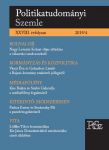Hazai és nemzetközi választáskutatási panelvizsgálatok. A lebonyolítás főbb elméleti és módszertani szempontjai
The main theoretical and methodological aspects of conducting panel surveys in national and international election studies
Author(s): Eszter Farkas, Pál SusánszkySubject(s): Electoral systems
Published by: MTA Politikai Tudományi Intézete
Keywords: national elections; panel survey; causal relationships; panel attrition; conditioning; partisanship; representation; political participation
Summary/Abstract: The results and correlations of politics related surveys receive a high level of public attention, especially before national elections. However, many people ignore the fact that single cross-sectional surveys cannot provide answers to a number of relevant questions in this field. Among other things it is not possible to discover changes in individuals’ preferences or the effects of political events and campaigns. To help fi ll this gap, and following international practices and trends, a research group in the Institute for Political Science at the Hungarian Academy of Social Sciences implemented a three-wave panel survey related to the 2018 Hungarian national elections. In the following article we summarize the methodological advances and main difficulties of panel surveys, and describe the research design of these surveys in both Hungarian and international research. Finally, the main questions of Election Study 2018 (NKFI K-119603) will be introduced.
Journal: Politikatudományi Szemle
- Issue Year: XXVIII/2019
- Issue No: 4
- Page Range: 119-134
- Page Count: 16
- Language: Hungarian

